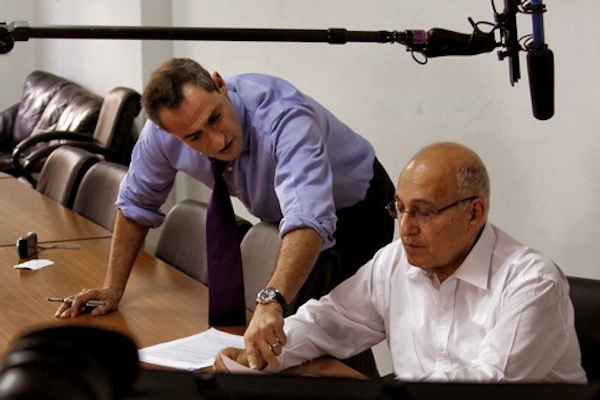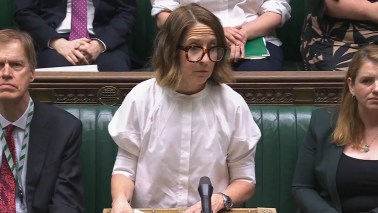But they weren’t conclusive: ‘to prove poisoning they needed to exhume my husband’s body and carry out more tests, I thought we must find out the truth.’ But if the truth’s important now, why wasn’t it in 2004? Why wasn’t an autopsy requested at his death? 3But what of the political dimension? Wasn’t there any pressure from the Palestinian leadership to request an autopsy? Suha’s response is unequivocal ‘No. None whatsoever’ — as unequivocal as the Palestinian leadership in their belief at the time that President Arafat was poisoned. Nabil Shaath, Arafat’s foreign minister, told me:‘I gave them a small holdall of Yasser’s with some of his belongings from the hospital for testing. The results showed there was a chance of poisoning because of the higher than normal level of Polonium.’
Yet in public, the very day after Arafat’s death, Shaath was reported as saying after talks with Arafat’s French doctors that they had ‘ruled out completely poison.’ So what was the reason for that barefaced lie? ‘From the very beginning there was a theory going around that this is a case of poisoning” said the Palestinian envoy to the UN and Yasser Arafat’s nephew, Nasser Al Qidwa, but no country wanted to take the political responsibility.‘I have no doubt that he was assassinated. The French said that whatever toxic material was in his body did not test positive in their toxicology table, saying in plain words this was a poison we did not have in our laboratories.’
From The Price of Kings, courtesy of Spirit Level Film
For the French to shy short of the truth makes political sense but why wouldn’t the Palestinian leadership demand an autopsy at the time? ‘Given that proof would have meant the end of the peace process’ is Al Qidwa’s explanation, corroborated by Shaath, ‘What kind of finger pointing we could have made at the Israelis, what kind of finger pointing the French could have made at the Israelis, I think was a matter of choice. Our leadership made a choice. We didn’t push for an autopsy.’ There is of course another reason why someone wouldn’t want an autopsy if they believed a murder had been committed. Guilt. We filmed at Arafat’s Presidential compound, the Muqaata, and it quickly becomes obvious that the reality of logistics on the ground meant if Arafat was poisoned, irrespective of who was behind it, they could not have got to him without collaborators. The Muqaata was surrounded by the IDF who ran security checks on supplies going into the compound. Even if poison was introduced into food at the security checks, there is no way it could be given to Arafat without an accomplice on the inside. This is perhaps the one incontrovertible fact amongst the vast amount of speculation around Arafat’s death. Something that clearly pains the head of the Palestinian commission on the investigation, Tawfiq Tirawi to say, even inside the same statement, ‘Some days we would get 100 chickens delivered. If someone put polonium or any sort of poison in his food, it must have been a Palestinian. Maybe – maybe – there was inside collaboration.’ Fingers have been pointed at even the highest echelons of the Palestinian leadership. Yet their speed in granting the required permission to exhume the body for further tests was not only impressive but also in distinct contradiction to the official line at the time of Arafat’s death. Indeed, there’s far more at stake from next weeks results than the fallout from Palestinian collaboration or the media pointing fingers at Israel. ‘If it is proved that Arafat was poisoned, we will go to the International Criminal Court.’ said Tirawi. That was only a possibility since last year and the Palestinians elevated status as a non-member observer state of the UN. It’s not a foregone conclusion the court would be prepared to hear a case, but if they do, though the smoking gun may be in the hands of a Palestinian collaborator, it will be Israel on trial. Less than a handful of nations have access to Polonium 210, Israel is one of them and would be the first country to sit in the dock in a case like this. Who do you think was responsible for your husband’s death? ‘We don’t even know if a crime was committed so how can I make accusations? I make no accusations, I have no pre-conceptions. We have to wait for the results — and if they are positive, then it’s up to the criminal investigation and the courts’ At a time when John Kerry and Tony Blair are traversing the Middle East to resurrect a non-existent peace process, wouldn’t it be better to have just moved on? According to Suha:‘It was France who accepted to try to save Arafat. We said we don’t expect them to tell us about that (the poisoning), but we expect them not to lie about the case. They didn’t lie, but of course they didn’t feel they were in a position to take the political responsibility by giving the necessary proof.’
John Kerry may not be so sure. From The Price of Kings, courtesy of Spirit Level Film‘No. If a crime has been committed it’s important that it’s documented – either way, the truth should be told. My husband is dead, it’s not possible that when new evidence emerges, we don’t investigate. Of course I’m nervous for the results, they’re very significant’ ‘And they’re coming at the same time as our daughter’s graduation which my husband would have been so proud to see. So I have very mixed emotions. I’m anxious, but again, I think it’s important the truth comes out.’






Comments